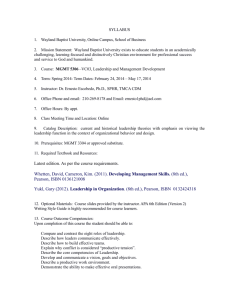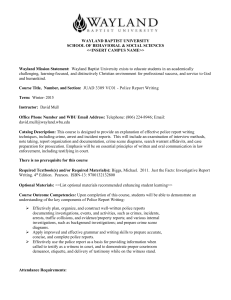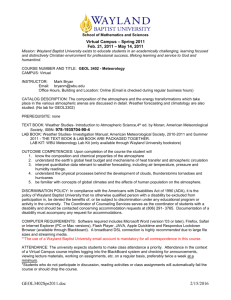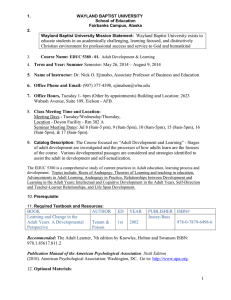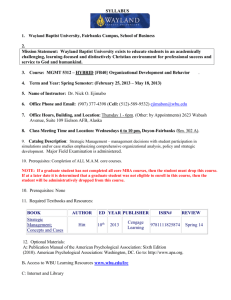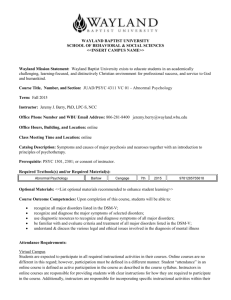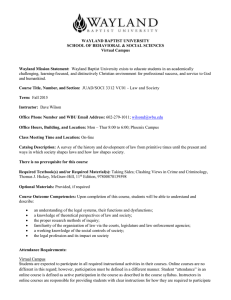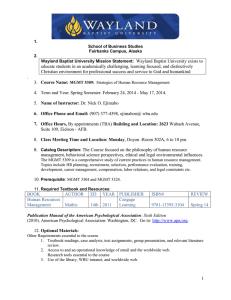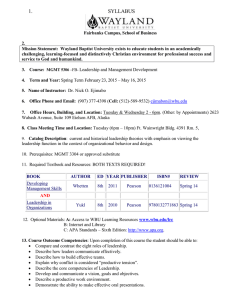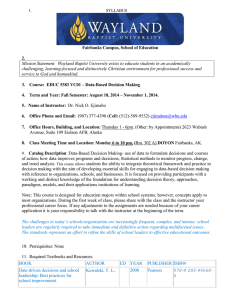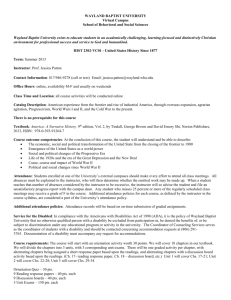MGMT 5313 - Wayland Baptist University
advertisement
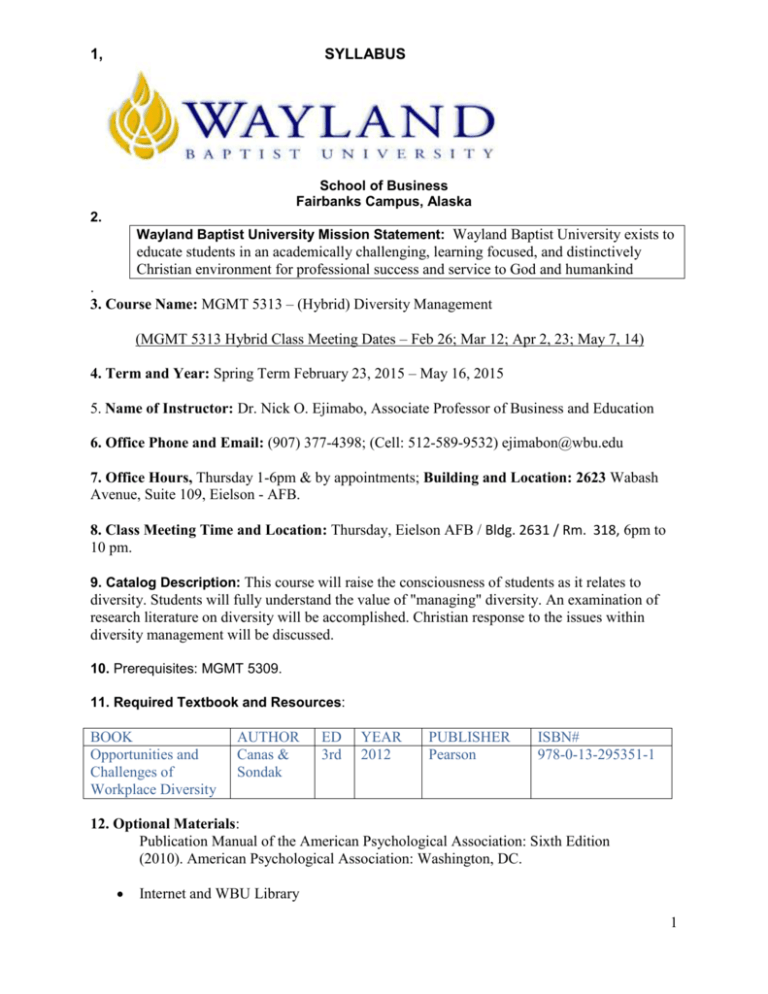
1, SYLLABUS School of Business Fairbanks Campus, Alaska 2. Wayland Baptist University Mission Statement: Wayland Baptist University exists to educate students in an academically challenging, learning focused, and distinctively Christian environment for professional success and service to God and humankind . 3. Course Name: MGMT 5313 – (Hybrid) Diversity Management (MGMT 5313 Hybrid Class Meeting Dates – Feb 26; Mar 12; Apr 2, 23; May 7, 14) 4. Term and Year: Spring Term February 23, 2015 – May 16, 2015 5. Name of Instructor: Dr. Nick O. Ejimabo, Associate Professor of Business and Education 6. Office Phone and Email: (907) 377-4398; (Cell: 512-589-9532) ejimabon@wbu.edu 7. Office Hours, Thursday 1-6pm & by appointments; Building and Location: 2623 Wabash Avenue, Suite 109, Eielson - AFB. 8. Class Meeting Time and Location: Thursday, Eielson AFB / Bldg. 2631 / Rm. 318, 6pm to 10 pm. 9. Catalog Description: This course will raise the consciousness of students as it relates to diversity. Students will fully understand the value of "managing" diversity. An examination of research literature on diversity will be accomplished. Christian response to the issues within diversity management will be discussed. 10. Prerequisites: MGMT 5309. 11. Required Textbook and Resources: BOOK Opportunities and Challenges of Workplace Diversity AUTHOR Canas & Sondak ED 3rd YEAR 2012 PUBLISHER Pearson ISBN# 978-0-13-295351-1 12. Optional Materials: Publication Manual of the American Psychological Association: Sixth Edition (2010). American Psychological Association: Washington, DC. Internet and WBU Library 1 13. Course Outcome Competencies: Upon the conclusion of this course, students will be able to: 1. Recognize the Awareness spectrum of: diversity, avoider, perpetuator, naive, fighter, and change agent 2. Recognize that individuals' differences can enhance productivity 3. Showcase the unique ways that some organizations are working to manage diversity and to illustrate that other organizations are limiting their diversity initiatives to legal compliance rather than to making systemic changes. 4. Improve critical thinking skills by developing and applying criteria to the evaluation of an organization's diversity initiatives. 5. Demonstrate an awareness and understanding of managing diversity from an individual perspective, a group identity perspective, and an organizational perspective. 14. Attendance Requirements: As stated in the Wayland Catalog, students enrolled at one of the University’s external campuses should make every effort to attend all class meetings. All absences must be explained to the instructor, who will then determine whether the omitted work may be made up. When a student reaches that number of absences considered by the instructor to be excessive, the instructor will so advise the student and file an unsatisfactory progress report with the campus executive director. Any student who misses 25 percent or more of the regularly scheduled class meetings will receive a grade of F in the course. Additional attendance policies for each course, as defined by the instructor in the course syllabus, are considered a part of the University’s attendance policy. Additional Attendance requirement: Excessive late arrivals or early departures will be taken into consideration. Material will be discussed in class and included in the exams that are not in the book. It is the student’s responsibility to obtain any material missed by not attending class for any reason. The student must not miss any more than 25% of the class. Any more misses may result in failure of the class. In case of TDY’s the instructor should be notified as soon as possible. 15. Disability Statement: “In compliance with the Americans with Disabilities Act of 1990 (ADA), it is the policy of Wayland Baptist University that no otherwise qualified person with a disability be excluded from participation in, be denied the benefits of, or be subject to discrimination under any educational program or activity in the university. The Coordinator of Counseling Services serves as the coordinator of students with a disability and should be contacted concerning accommodation requests at (806) 291- 3765. Documentation of a disability must accompany any request for accommodations.” STUDENT RESPONSIBILITY: Students are responsible for reading, understanding, obeying, and respecting all academic policies, with added emphasis being placed upon academic progress policies, appearing in the Wayland Baptist University Academic Catalog applicable to their curriculum and/or program of study. 2 16. Course Requirements: Grading Assignments and Points 16: Course Requirements and Grading Criteria: Assignments and Points a. Reflection paper: Students will prepare reflective summaries and create a collection of materials to utilize in future endeavors in Work Place Diversity. The will be four reflective papers in this semester (TBD). Each student will be assigned /select a special topic from the subject matter of our course. The reflection paper will be discussed in the class. Total value = 20 points. b. Team Project Paper/presentation: A minimum 12- 15 page (content pages, excluding cover sheet, abstract and references) on a subject directly related to the benefits and challenges of diversity in organizations will be the focus of the project. The team /group project and requirements will be discussed in the class, and would enable students demonstrate a growing proficiency in understanding the importance of organizational diversity. Topics must be listed on sign-up sheet and initialed by instructor. Proper APA format is required. Total point value of 25 points. c. Examination: One examination (Final 20 point) will be given during the term. Questions will be mostly multiple choices along with some essay questions. Format and areas of study will be discussed and reviewed in the class before each exam. Total point value of 20 points d. Case Study Activities: Case Study (There are 17 Case Study Assignments in the Diversity text – they will be due at various times – check the assignments page for specifics). Format and areas of study will be discussed and reviewed in the class before each case study activity. Total point value of 20 points d. Attendance Class Discussion and Participation You are expected to attend, participate and respond to the discussions and questions in every class. It involves answering of questions, personal experience, and suggestion on what you think about the class discussions and topics. Class participation is a grade activity that reflects preparedness for class as well as attendance. Arrive on time with assigned reading and papers completed on the prearranged deadline. Total point value of 15 points. Note: Students are required to demonstrate proficiency in the requirements covered in this Syllabus and in class. Students who are underperforming or who believe they need additional help are to inform the instructor or dean immediately. 17. This course outline serves merely as the anticipated roadmap I hope to use during this 11 weeks program. However, due to circumstances and the dynamic nature of this course, there may be some changes in the schedule. During such situations, you will be advised and changes will be discussed and noted accordingly. The dates and weeks listed below are the dates by which the course materials are expected to have been read. Week Date Activities/discussions Reading assignment 2/26/15 Introduction & Course Overview. “Getting to Know You”. Uncovering the Complexities of Workplace diversity: A theoretical & Pedagogical Perspective Canas & Sondak: Ch. 1 1 Class meeting 3 2 3/5/15 Diversity in the workplace: A legal perspective Ch. 2 Reflection# 1 due 3 5/12/15 Class meeting An Integrated Approach to Managing Diversity in Organizations Ch. 3 Project Paper Topic Selection 3/16/15 – 3/20/15 SPRING BREAK 4 3/26/15 Examples of Diversity Leaders and Organizations Challenges 5 4/2/15 Class meeting Importance Ch. 4 Journal/Article Collection for Research Topic Managing & Mismanaging: Case Studies on American Ch. 5 & 6 Blackboard discussion Businesses Gender, Race & National Origin Essay – p.90 Case studies – pg. 102, 109, 131, & 144 6 4/9/15 Age, Religion, & Spirituality 7 4/16/15 Sexual Orientation, Gender Identity, & Disability Case Study pg. 231, 234, & 262 Review of Mid Term Exam: Read Ch. 1- 6 Ch. 7 - 8 Mid Term Exam (Take Home). Ch. 9-10 Mid Term Exam due 8 4/23/15 Class meeting Developing Three Essential Skills Analyzing Self Understanding Difference Assessing Organization Ch. 11-13 Review on special topics 9 4/30/15 Developing Three Essential Skills(Continued). • Analyzing Self • Understanding Difference • Assessing Organization Final Exam Ch. 11-13(continued). 10 5/7/15 Class meeting 11 5/14/15 User Reference Tools/Evaluations/feedbacks Class End of class meeting Note: The Instructor reserves the right to change the syllabus. Review for final Exam Final Exam Power Point Presentation Project paper due 18. Grading Schema/Scale: A = 90-100%, D = 60-69% B = 80-89%, F = 59 and below C = 70-79%, I = Incomplete Note: All assignments will have due dates and late penalties. Failure to submit assignments on time will result in the reduction of your grade by 10 points per 24-hour period following the due date. 4 20. ADDITIONAL COURSE REQUIREMENTS: Readings: Assigned readings are to be completed prior to the class session for which they are assigned. CLASSROOM COURTESY: Exhibit courtesy to everyone in your class by being on time and staying for the entire class time. Turn cell phones off and do not use them during class. Use cell phone outside of the classroom during breaks. Limit your discussions to course content. 21. POLICY ON ACADEMIC INTEGRITY: The University proudly adheres to high standards of intellectual, moral, ethical, and spiritual values. It entrusts each student with the solemn obligation of preserving these standards. In light of revelation, reason, and custom of the Christian community from which the University has grown, personal integrity in keeping with New Testament standards is expected of all students. Academic dishonesty, including cheating and plagiarism, may be grounds for disciplinary action by the University and, at minimum, will result in a grade of zero /F on that project. 22. Format of Course deliverables All course assignment must be submitted in the class. All course deliverables must be constructed in Times New Roman, 12pt font, double spaced, and submitted in Microsoft Word format. The use of APA format prescribed in the Publication Manual of the American Psychological Association 6th Edition is encouraged. 5
